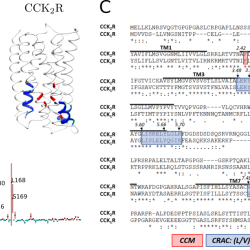
Evidence that specific interactions play a role in the cholesterol sensitivity of G protein-coupled receptors
G protein-coupled receptors (GPCRs) make up the largest family of proteins in mammals. GPCRs are signaling proteins in the cellular membrane characterized by seven transmembrane helices. These proteins regulate many physiological functions, making them an important drug target for a variety illnesses. GPCR signaling is known to be sensitive to cholesterol in the membrane but how exactly the signaling is modulated is not well understood. Cholesterol has been hypothesized to act as an allosteric modulator on GPCRs, which will interact with the protein at specific sites. However, some homologous GPCRs (CCK1R and CCK2R in this case) show differential sensitivity to cholesterol, where CCK1R is more sensitive to membrane cholesterol than CCK2R. In an attempt to identify these interaction sites, coarse-grained molecular dynamics simulations (CGMD) were used to observe protein-cholesterol contacts. Cholesterol off-rates for these two homologous proteins showed longer contacts for CCK1R on equivalent residues 1.
References
- a James Geiger, Rick Sexton, Zina Al-Sahouri, Ming-Yue Lee, Eugene Chun, Kaleeckal G. Harikumar, Laurence J. Miller, Oliver Beckstein, Wei Liu, Evidence that specific interactions play a role in the cholesterol sensitivity of G protein-coupled receptors, Biochimica et Biophysica Acta (BBA) – Biomembranes, 2021, 183557, doi: 10.1016/j.bbamem.2021.183557.



Discuss: “Evidence that specific interactions play a role in the cholesterol sensitivity of G protein-coupled receptors”